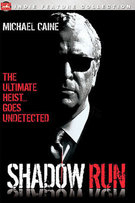Quicksand (2003)

Quicksand was the last of the five films Sir Michael Caine made with his long-time friend, the British producer Geoffrey Reeve and the last of three films with director Mackenzie (The Honorary Consul, The Fourth Protocol). It’s based on the novel Boudapesti 3 by Desmond Lowden, who wrote the screenplay for Shadow Run, which Geoffrey Reeve directed and produced, and which also starred Michael Caine. So, this is undoubtedly one of those films where Sir Michael saw the chance to hang out with his friends on a yacht in Nice and get paid for doing so. Who among us wouldn't?
It concerns a buttoned-up bank Compliance Officer, Martin Raikes (Keaton), who is sent by his bank to Nice to investigate some unusual financial goings-on with a film production company, Group Lumière, possibly tied to money laundering. The audience already know that there’s money laundering going on for sure, because we’ve seen Group Lumière’s owner, Oleg Butraskaya (Rade Serbedzija), in a face-off with a corrupt cop which ends up with Oleg waking up next to a dead lady-friend.
On arrival in Nice, Martin meets up with Lela Forin (Godrèche), chief financial officer of the production company, and she assures him that nothing is amiss. He also gets to meet the star of the latest film, Jake Meddows (Caine), an ageing action star in the Steven Seagal mould who’s a bit of a diva. They all make nice, and Martin returns to his hotel room, mostly satisfied that there are no irregularities and planning to go to London the next day to visit his daughter and ex-wife. Martin’s not even suspicious when a Russian man turns up at his hotel door and tries to give him a suitcase full of cash, which Martin merely informs him must be a mistake and returns promptly.
The next morning, Martin is called to a second meeting with Lela, only to find that chauffeur sent for him has delivered him to an empty hotel room. Martin wanders out onto the balcony, where he finds a sniper rifle which, for no apparent reason that sense would dictate, he picks up, and begins to look around, as if the rightful owner has merely misplaced it and might be lurking around looking for it. In the Nice civic square beneath the balcony, the crooked Chief of Police is delivering a Remembrance Day speech to a large crowd and several convenient French TV crews. The Chief is, of course, assassinated, and the film crews all spin around to catch footage of Martin still hugging the sniper rifle lovingly to his chest. Thus, Martin is forced on the run, and of course he decides to fight fire with fire by going after Oleg Butraskaya’s gang himself, with Lela in tow.
The whole ‘innocent man caught up in events over his head’ is the stuff of almost every airport thriller featuring a dark jacket with the silhouette of a man running. And, on the page, perhaps Martin’s ingenuity and sheer skill once he becomes a fugitive is fully explained. In the movie, we’re left with a clip of a TV news reporter (Bob Friend from Sky News UK, the 1990s go-to guy for being featured on TV news shown in movies, in Independence Day and Mission: Impossible) hinting that there are unconfirmed reports that Martin was in the CIA before becoming a banker. It’s not explored or confirmed by the movie, but would be the only possible explanation for the level of Jason Bourne skill shown by Martin as he seeks his revenge.
The dialogue is frequently implausible, if not preposterous; there are plot holes you could drive a truck through; character motivations are murky at best; and the ending is utterly ridiculous. One scene even has Martin calling down to the hotel front desk to have them book him a morning flight to London, like he’s Cary Grant and it’s 1955, and not the post-9/11 world where international flights need arranged far in advance, and with access to a passport, credit card and proof of a visa waiver. And, still, the whole thing is utterly watchable, mostly because the cast are all so good. Keaton has been underrated for years (until possibly Birdman), but he is a very watchable everyman presence on screen. Caine isn’t in it enough, barely making an appearance until the last twenty minutes, but he has real impact in a role that he’s a good 20 years too old for (but then so is Steven Seagal these days, so who’s to judge?). Even the lesser supporting roles are taken by really good actors like Berkeley and Wilhoite. They play Martin’s best friends and colleagues, and they’re also not in it enough, because I would genuinely watch a movie where those three investigate financial crimes together.
Although filmed in 2000, and hawked around the various international festivals in 2001/2, it wasn’t released theatrically until 2004 in the US, and not at all in the UK. In most countries, it went straight to either TV or DVD, and can be hard to pick up, although Amazon Prime has it for free in some territories as part of their streaming package.
